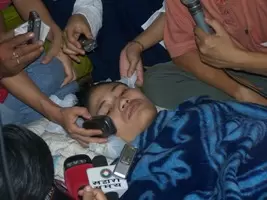A living story of non-violence, resistance and iron will

18-March-2011
Vol 2 | Issue 11
I'll spread the fragrance of peace
From Kanglei, my birthplace
In the ages to come
It will spread all over the world..
-lrom Sharmila
She is a living story of peace, non-violence, resistance. Her strength is unmatched, her determination strong. She has decided to singlehandedly take on the mighty Indian State. Suffering in solitude on a hospital bed in Manipur, she refuses to eat. She even cleans her teeth with dry cotton ensuring not even a drop of water escapes inside her body. She is on an indefinite fast for more than a decade now. Last week, she was released from judicial custody on completion of her one year imprisonment (for trying to commit suicide), but rearrested as she continued her fast-unto-death.
Forcibly fed lentil soup through a catheter attached to her nose, in perpetual imprisonment, somehow, they just can’t let her die. They are not allowing her to live in peace either, or give in to her infinite demand of a less brutal society, end to fake encounters and violent repression, a repeal of the draconian Armed Forces Special Powers Act (AFSPA) in Manipur and the rest of the north-east, a law which gives sweeping powers to the unaccountable security forces to unleash organised injustice and get away with it, a law which is a license to kill.
- The AFSPA was passed in 1958 by an act of Parliament. It conferred special powers upon armed forces in allegedly "disturbed areas" in Arunachal Pradesh, Assam, Manipur, Meghalaya, Mizoram, Nagaland and Tripura. It was consequently extended to Jammu and Kashmir as The Armed Forces (Jammu and Kashmir) Special Powers Act, 1990 in July 1990. Hence, the security forces, in these areas, can… "Fire upon or otherwise use force, even to the causing of death, against any person who is acting in contravention of any law" or against "assembly of five or more persons..." It can arrest without a warrant and can also enter and search any premises to make arrests.
The darkest dimension is that it gives the security forces ‘legal immunity’ for their actions. There can be no prosecution, suit or any other legal proceeding against anyone acting under that law. Nor is the government's judgment on why an area is found to be "disturbed" subject to judicial review. No wonder, human rights activists, constitutional experts and democrats call this law “brazenly draconian and anti-people”.
 |
|
Fast and firm: Irom Sharmila’s non-violent struggle against a draconian law that gives sweeping powers to the security forces is shaking the nation’s conscience (Photo by Harsh Dobhal)
|
With Irom Sharlima, AFSPA arrived as a vicious circle. It all started on the fated day of Thursday, November 2, 2000, when the notorious Assam Rifles indiscriminately and without provocation gunned down a group of 10 citizens at a bus stop in Malom in retaliation to an alleged attack on their convoy the same morning by unknown persons. Most of the killed were women and children. Irom Sharmila Chanu, who was then a 28-year-old young human rights activist, went up to her mother Sukhi Devi, sought her blessings and quickly decided to prolong her weekly Thursday fast. Thus arrived the starting point of the legendary fast-unto-death of an ordinary, young, almost apolitical Manipuri woman, who, until now, would cycle to meetings and the market, living a quiet and obscure life.
In that sense, she reflects and represents the collective, silent and suppressed angst against army atrocities hidden in the deepest interiors of Manipuri consciousness. That is why she truly represents the Manipuri non-violent struggle against organised State violence. Ironically, and as is the norm in Northeast when it comes to injustice, the truth behind the Malom massacre is not yet known and the endless enquiry is still on.
In the Northeastern state of Manipur and beyond, Irom Sharmila is an iconic figure. The people of Manipur refer to her as Menghaobi, the fair one. She has become the face of their alienation and resistance, their opposition to the arbitrary ways of the Indian State ruled by Delhi where innocent young men and women have been routinely killed and raped by sections of the Indian security forces. The Manorama Devi rape and encounter is still fresh in the minds of the women of Manipur. Then, in disgust and anger, the mothers of Manipur had come out of their homes, stripped naked outside the Assam Rifles headquarters in Imphal, and challenged the army to come and rape them: “Come Indian Army, Come, Rape Us,” said the banner held by the naked ‘mothers of Manipur’.
Sharmila’s demands are plain and simple. “Repeal the AFSPA,” she says, in her soft, subdued, hushed up voice. However, the State has not budged even one inch. Her demands have been put down and every year she has been charged under Section 309, which entails one year in prison for the attempt to take one’s own life. This is a repressive ritual repeated routinely, as it was done recently. She would again be transferred to the ‘jail-ward’ of JLN Medical College in Imphal where the doctors are instructed to feed her forcibly.
A poetess and a voracious reader, she spends her time reading and writing and likes to do her work herself. “I have to be strong. I have to fight,” she has said during her days in AIIMS in New Delhi where she was kept in detention in 2006. Before that, she suddenly arrived at the Jantar Mantar in Delhi with her friends and supporters and continued her fast on the street, in the heart of Delhi, next to the Indian Parliament, even as thousands of civil society groups, students from JNU, Jamia and Delhi University, apart from Manipuris, surrounded her in support. She would lie down in the open, vulnerable and fragile, and still manage to give a speech against AFSPA or read a poem. She was finally forcibly lifted by a huge police contingent, at midnight, and confined to the AIIMS. Her poems continued:
Free my feet from the shackles
Like bangles made of thorn
Confined inside a narrow room
My fault lies in
Being incarnated as a bird..
Even after ten years of continuous struggle, things have not changed in Manipur. Scores of people have been killed in encounters, many of them fake and unverified. In one such episode, a ghastly series of photographs nailed the lies propagated by the establishment: an unarmed former militant, Chunkham Sanjit, was taken inside a shop in a public place and killed in cold blood. There have been many such incidents which have escaped the so-called mainstream media in Delhi. The mainstream media has mostly refused to report about the atrocities. Not a line is written, not a single question asked.
Born in the family of a class IV employee in 1972, Sharmila is the youngest among nine siblings. She was breast fed by other women for her mother was already dry when she was born. “Perhaps that is why she has grown so socially conscious and politically committed,” her brother Singhajit told a journalist. True to her destiny, now she is a daughter for all the mothers of Manipur. Her determination, her resolve, is a negation of the brutality of the establishment and an affirmation of the positive dimensions of resistance, the will to fight and hope for a better world, without violence and injustice.
“My spiritual fight for the sake of justice will definitely succeed... In this mundane world, living creatures are bound to die some day. So I don’t have any unnecessary fear for my life...,” she said in an interview. Hence she fasts, eternally. Fearless Irom, with iron in her soul.
With Sadiq Naqvi, New Delhi














